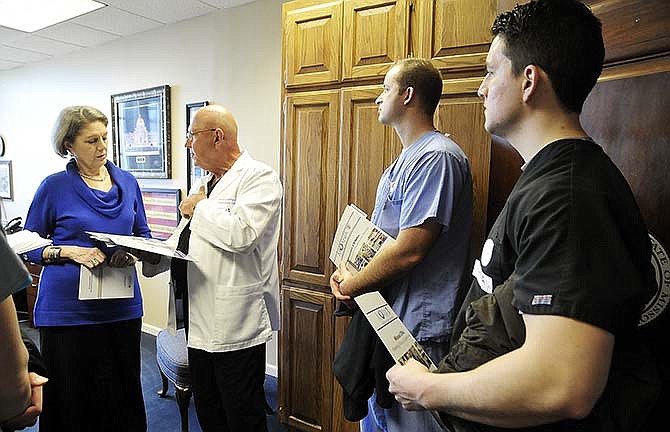You may be just one person - as opposed to a Fortune 500 company with a fleet of high-powered lobbyists - but don't assume that your voice won't be heard if you go to Missouri's Capitol.
House Speaker John Diehl said one of his favorite parts of the job is talking to constituents about their issues.
"Virtually every group I talk to, I tell them, "Don't underestimate your ability as an individual to affect public policy at the state level," said Diehl, R-Town and Country. "Unlike Washington, D.C. ... your representatives here in the state Capitol are pretty accessible. Almost any given day, you can come up and see your representative or see your senator without an appointment and without a lot of fanfare."
Still, common courtesies combined with some basic knowledge of how the process works can help further your cause.
While lawmakers' primary job is to consider new state laws, your elected representatives at the Capitol also can help you out with issues involving government services.
Rep. Mike Bernskoetter, R-Jefferson City, said constituents often call him about receiving government benefits. State workers sometimes call or email about issues they are having in their jobs, such as problems with receiving their vacation time, sick leave or insurance.
"We do a lot of that stuff for constituents," Bernskoetter said.
Sometimes, he said, his office is able to put in a call or two to the proper people and get the issue resolved. Other times, it's not that simple, and it might be an issue the office can't help with.
His advice? Ideally, get to know your elected officials before you need to ask them for something. Introduce yourself at a fish fry, ham and beans dinner, chili cook-off or other event.
"Come up to me at the grocery store and say "Hi,'" Bernskoetter said. "Come up to me at church. That happens a lot.
"I'm very accessible, so it doesn't offend me if somebody comes up to me at the grocery store and starts talking to me."
Rep. Jay Barnes, R-Jefferson City, said the best lobbyists at the Capitol not only will tell you their side of the argument on an issue, but will be able to tell you who represents the other side of the issue, as well as their main arguments.
"Some lobbyists in the Capitol are not open and honest and may not realize that hinders their success as lobbyists," he said.
They might have success with an issue in the short term, but they won't be successful in the long term, Barnes said.
When a group speaks with Diehl about an issue, he routinely asks them: What will the other side say?
If you meet any of four criteria, such as being paid or designated as a lobbyist by an individual or group you are representing, you are considered a lobbyist by the Missouri Ethics Commission and must register as one. But individuals or groups still can perform advocacy - the non-professional version of lobbying.
Even professional lobbyists or groups that visit the Capitol for their annual advocacy day make mistakes that hurt, not help, their cause, lawmakers say.
"I think probably the example of the worst advocacy I've seen in this building in my six years up here has been advocacy for - I'm not saying all, but some - of the groups advocating for Medicaid expansion," Diehl said.
Some supporters have shown no in-depth knowledge of the issue or the financial implications, he said.
"(They say) we need it now, and if you don't do it, you're killing people and hospitals are going to die." They also held mock funerals for Medicaid expansion and handed out "death certificates."
"That stuff just doesn't move the needle along," Diehl said. "In fact, what it does typically is make legislators not even want to discuss the topic because there's no rational person to discuss it with."
Bernskoetter said that regardless of your position on an issue and how your lawmakers feel about it, you don't want to burn bridges - like when Medicaid expansion supporters disrupted the Senate last year and were arrested.
Such stunts take the place of trying to work together on issues.
"We may not be with you on every issue, but a lot of times we can find common ground," he said.
Sen. Mike Kehoe, R-Jefferson City, agreed, saying that disrupting the Senate holds up work on issues that is important to others. He said that, like in any relationship, you should always try to leave on good terms. "Just like you never want to go to bed mad at your wife. You want to work it out. There's going to be another day," he said.
Diehl said a recent example of a good lobbying effort was when a group representing NRG Energy came to his office to push for opening electric generation for bidding in Missouri. They argued that putting it out for bids could ultimately save money for ratepayers.
"I haven't decided where I'm going to be on the issue yet ... but they came in made a very short, clear, precise presentation," he said.
Barnes recalled a situation during his freshman year in which a neighbor of his, local attorney Reg Turnbull, approached him with proposed legislation dealing with probate proceedings.
Barnes not only introduced the bill for Turnbull, but he thwarted efforts by members of his own party - much to their chagrin - to amend bills onto his bill, which would have lessened its chance of passage.
He guided the bill through the frenzied last weeks of the session, eventually getting it passed and signed into law.
"I fight to get bills brought to me by constituents across the finish line just as hard as bills I thought of on my own," Barnes said.
Rebecca McClanahan also took what some might consider unusual efforts in advocacy.
She is a registered nurse who serves as president of the Missouri Nurses Association (MONA) Executive Board.
She's also a former House member, so she knows how the process works.
When MONA lobbied for Medicaid expansion this session, she made an appointment with Diehl. The two served in the House together in recent years - she as a Democrat and he as a Republican.
When she went to the meeting, she brought along her state representative, Nate Walker, R-Kirksville - who challenged and defeated McClanahan for her House seat in 2012.
"Issues in the Capitol transcend campaigns," she said. "It transcends any personal feelings I had for what went on in the campaign or didn't go on in the campaign.
"So I asked him to go with me to the meeting."
Although McClanahan and Diehl "disagree vehemently" about Medicaid expansion, she said the meeting went well and "we are in a continued conversation. He was very receptive to me. In fact, we had a delightful conversation."
That's the other lesson that lobbyists and lawmakers stress: patience. Often, changing state laws is a multi-year process. So if at first you don't succeed...


